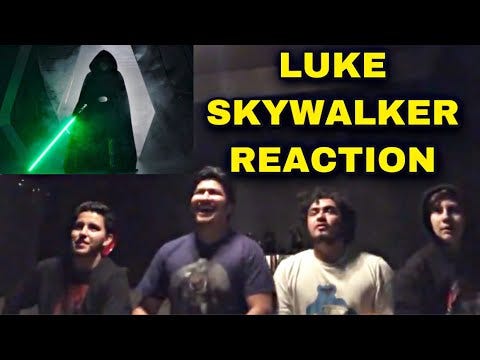Reading the tea leaves in a famous "reaction video"
Are the "toxic" Star Wars fans wars about race, gender, politics or class?
I have never been a Star Wars nerd.
As someone who was just out of college when “Star Wars: A New Hope” was released, I was a prime candidate for that level of devotion — especially since I was a journalist near a giant university (and then a graduate student) when that first cultural earthquake hit.
I would say that I was an excited fan, after the first trilogy. When the second trilogy came out, my hopes were high — but I dismissed the prequels as glorified video games that didn’t live up to the legacy of the first movies.
Oh, I wrote a 1999 “On Religion” column about one of the more bizarre “religion” angle debates linked to the Anakin Skywalker origin myths. Here’s a same of that, drawn from a column with this headline: “The Star Wars nativity story.”
… the key moment in the cosmos of mythmaker George Lucas is when Jedi Master Qui-Gon Jinn asks Shmi Skywalker to identify the father of her mysterious young son, Anakin, who will someday become the evil Darth Vader.
"There is no father," she replies, in Terry Brooks' novel "Star Wars: Episode I, The Phantom Menace," which is based on the screenplay by Lucas.
"I carried him, I gave birth to him. I raised him. I can't tell you any more than that."
Now, that concept is a giant leap of faith beyond the original theological question that parents and clergy heard during and after the first trilogy: “Is the Force the same thing as God?” I remember asking a wire-service editor if that reference should be “force” or “Force.” That’s a relevant question since, in Associated Press style, many types of references to “God” ( as opposed to “a god”) are uppercase (see this 1997 column, “George Lucas, the Force and God”).
These kinds of questions didn’t go away when it was time for theological debates about the third trilogy (I’ve never seen “Star Wars: Episode XI — The Rise of Starwalker,” as I mentioned the other day).
But let’s go back to a column from 1999, “Star Wars — the only parable in town,” for some material linked to the subject at the heart of this post.
This is linked to my ongoing ruminations on why, in terms of the importance of American popular culture (and thus global culture), the financial and artistic trainwrecks linked to the Star Wars empire are important to the work I do with this Rational Sheep project.
Read this long passage carefully:
The Rev. Calvin Miller is one Southern Baptist preacher — a seminary professor, no less — who openly admits that he communed with the Star Wars faithful on the opening day of "The Phantom Menace."
He pretty much got what he expected — high tech fantasy and lowest-common-denominator mysticism, stone-faced knights and wisecracking sidekicks ready for toy-store shelves. George Lucas keeps offering a pinch of Freud, a shot of Oedipus and a baptism into Buddhism. Miller grimaced, but wasn't shocked, when the mythmaker even tossed in a virgin birth and a messianic prophecy.
"We have to understand that people are out there hunting for metaphors to help them make sense of their lives," said Miller, who teaches preaching at Samford University's Beeson Divinity School in Birmingham, Ala. He also has written more than 30 works of fiction and nonfiction, including a set of poetic novels entitled "The Singer Trilogy."
Keep reading with a 7-day free trial
Subscribe to Terry Mattingly -- Rational Sheep to keep reading this post and get 7 days of free access to the full post archives.




